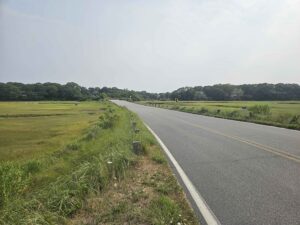EASTHAM — Assistant Town Administrator Rich Bienvenue threw cold water on summer small talk when he opened a gathering at the public library here on July 29. The value of property in Eastham totals $5.2 billion, he reported, but more than 26 percent of the town is within a FEMA-designated Special Flood Hazard Area (SFHA).

“That includes the only two ways to get from Eastham to the rest of the Cape: Bridge Road and Route 6,” he said. Both roads are vulnerable to flooding, according to a 2024 report by the Woods Hole Group.
Cape Cod Commission Deputy Director Steve Tupper added that $925 million of the town’s assessed property value is located within the SFHA, including 68 inventoried historic structures.
The 50 or so people in the room that day were braced for such challenging information. They were there to participate in a workshop organized by the town’s Energy and Climate Action Committee and the Cape Cod Commission aimed at setting priorities for local action.
Committee chair Tom McNellis was not surprised by the size of the crowd. “We’ve found that there are a lot of people who are very interested in finding out what’s going to happen,” McNellis said. “What are we going to be faced with? What should we do to protect ourselves?”
Since January, the commission has been working with the town to develop what it calls a comprehensive roadmap for addressing climate change. The final set of recommendations will be presented to the select board sometime this fall, with the goal of adoption by the town early next year, McNellis said.
Because Eastham had already done a climate action survey and conducted a greenhouse gas emissions inventory in 2024, the commission chose it as the first town on the Cape to pilot the collaborative development of a local action plan, according to the commission’s special projects manager, Helaine Goudreau.
A need for education was the common thread among participants’ comments. Some said that meant the need for community members to know more about climate change itself; others said everyone needs to know more about what they can do as individuals to address the changes climate change is bringing.
One person suggested making the town’s climate action plan a “living document” that could continually show the town the costs of both action and inaction.
Several audience members spoke about the importance of preserving the town’s natural resources and walking trails. There were also calls for better infrastructure to protect neighborhoods during storms.
McNellis said he hoped Eastham could look to the commission for help creating a climate action plan that fits the size of the town. “There have been a couple of very good climate action plans done by larger towns and cities, but not a lot that we found for towns the size of Eastham,” he said.
McNellis also raised the question of how Eastham’s needs and ideas fit into regional plans. “A big part of what we need to do is fit in with the regional context,” he said.
Zoning task force chair Mary Nee, who said she was there as a community member, not an official, said it was “important for the town to do this kind of deep-dive planning” to prepare for serious storms and erosion that could threaten coastal properties.
“When a property falls in the water, the town scrambles to figure out what to do,” Nee said. “What happens if there’s a major storm and suddenly you have 10 properties hanging over the coast? The issue of being prepared is foremost in my mind.”
Nee later said she would appreciate having the finished climate action plan to guide her task force through the creation of new zoning amendments. “We’d want to see the data,” she said. “We’d also want to see that the town has embraced their goals for resiliency.”
Goudreau said the next milestone in the creation of Eastham’s climate action plan is a workshop to be scheduled in October, at which the commission will present a list of priorities based on input from the July 29 session.
Even though the climate action plan is expected to be complete sometime this winter, Goudreau said she expects to continue working with the town and region indefinitely. “In this case, I don’t think the work is ever done,” she said.



